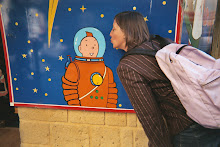
Jean Baptisté is the Monitoring & Evaluation specialist for our Child Survival Project. We work quite closely together because a majority of my internship is working on monitoring and compiling data. This man is very easy to love. Last week he asked me the difference between “like” and “love” because in Kirundi there is no differentiation. I tried to explain it to him, but as you know, both “like” and “love” have many nuances. Because he speaks English very well, having gone to Theology school in
Uganda and
Kenya, I think he understood me. One of his favorite things to say is, “You give me your heart, I give you my hand.” Part of what he’s saying is that building relationships is the foundation for being generous, or “don’t just ask me for my money, but seek to know me.” He has been both generous and sought to know me.
I went to dinner at his home Saturday night. He is married to a woman, Mirielle, from Congo, and they have two precious daughters, Sheila (almost 2) and Donna (1 month). Mirielle made us my first hamburger in Burundi along with grilled fish and frites, the African version of French fries. I had another first, my first “taxi” ride in Bujumbura to get to and from his place. I pieced together enough French, Kirundi and English to communicate. However, driving in Burundi is quite an experience…the biggest vehicle always gets the right of way, traffic signs mean nothing (they don’t have traffic lights, although it honestly wouldn’t make a difference), there are no speed limits and seatbelts are optional (I prefer to wear them when available for the above mentioned reasons). Needless to say, I was charged the “muzungu” (white person’s) price for the taxi. There is really no standard rate or meter running. I didn’t feel too terribly bad about it though because fuel costs even more here than in the States at about $7 per gallon.
Jean Baptisté was a refugee in Tanzania near Kigoma for many years. He tried to explain the system for choosing which refugees will be allowed shelter in the States. From his perspective, people appear to be chosen randomly. It almost sounds like Charle and the Chocolate Factory when Charlie found the golden ticket. He is an example of a refugee who has done well despite his circumstances. But he, and many other Burundians, would really like to go to the U.S. In fact, Trina’s tennis coach teased me about trading skin color (along with a few other anatomical parts) and passports so he could go back in my place. Burundi can be a very difficult place to survive if you are Burundian, and although I like to call myself a Murundi-kazi (a female Burundian), I have been born with privileges unknown to most who call this their birthplace.
 Jean Baptisté is the Monitoring & Evaluation specialist for our Child Survival Project. We work quite closely together because a majority of my internship is working on monitoring and compiling data. This man is very easy to love. Last week he asked me the difference between “like” and “love” because in Kirundi there is no differentiation. I tried to explain it to him, but as you know, both “like” and “love” have many nuances. Because he speaks English very well, having gone to Theology school in
Jean Baptisté is the Monitoring & Evaluation specialist for our Child Survival Project. We work quite closely together because a majority of my internship is working on monitoring and compiling data. This man is very easy to love. Last week he asked me the difference between “like” and “love” because in Kirundi there is no differentiation. I tried to explain it to him, but as you know, both “like” and “love” have many nuances. Because he speaks English very well, having gone to Theology school in 

1 comment:
Vive les pommes frites!
Post a Comment